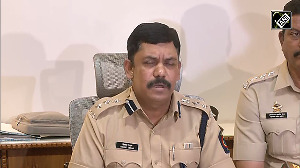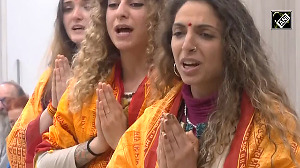Meeting Karpoori Thakur, the twice chief minister of a volatile state like Bihar, where he was reviled and respected in equal measure, was always easy for me and anybody who sought his audience.

That he has been chosen for the country's highest civilian award, the Bharat Ratna, comes as a bit of surprise to me as it would to even his most ardent admirers.
The 'Jan Nayak' (people's leader) joins the pantheon of great political leaders like Lal Bahadur Shastri, Pandit Madan Mohan Malaviya, Lokpriya Gopinath Bordoloi, and Loknayak Jayaprakash Narayan, who were honoured with the award posthumously.
As a school student, I had seen him frequent the sprawling house of Jayaprakash Narayan on the narrow Jagat Narayan Lal Road in the once posh locality of the Bihar capital in Kadam Kuan.
When I joined PTI in 1986, he was the leader of the opposition.
He had by then been the chief minister of Bihar twice in the 1970s but had no qualms about hiring a cycle-rickshaw to transport him to the offices of news organisations, particularly PTI.
S K Ghosh, fondly called Mantu Da, the amiable and ebullient bureau chief, was his friend.
Mantu Da had died when I first saw Thakur, one of the most articulate leaders of the socialist school I can remember, arrive in our office on a cycle rickshaw. S D Narayan was then the chief of bureau.
Thakur would enter the newsroom alone, as quietly as he could, with his rubber-soled sandals aiding him in the endeavour, and sit unobtrusively on the recliner Mantu Da had ordered for himself. He would then request us for a piece of paper on which he wrote his press releases, and leave as quietly as he came.
Thakur, considered the fountainhead of OBC politics in Bihar, was a foodie and loved the steaming hot balushahi and laddu prepared at the state assembly canteen.
He would often pester his journalist guests to have some more.
Thakur's private secretary Abdul Bari Siddiqui, his Man Friday, told us Thakur ji is happy when his guests have their fill of the food he offered. Siddiqui rose to become a minister and the state president of Lalu Prasad's Rashtriya Janata Dal.
Sharad Yadav, a socialist stalwart and mentor to many a leader like Lalu Prasad and Nitish Kumar, was like a disciple.
On a cold January evening, when I visited Thakur, he had a bad cough. Wrapped in blankets in the portico of his bungalow, he sipped on 'Kadha', a concoction made from tulsi and black pepper, to soothe his sore throat. He had three of those in massive stainless steel tumblers while Yadav and I waited for him to speak.
He spoke well and spoke loud about the rights of the backward classes (OBCs) much before Vishwanath Pratap Singh used the Mandal Commission report as a tool to thwart L K Advani's Rath Yatra from Somnath to Ayodhya to revive the Ram temple movement.
Thakur's tenure as chief minister is best remembered for implementation of the recommendations of the Mungeri Lal Commission, whereby quotas for backward classes were introduced in the state in 1978. This panel was the forerunner of the Mandal Commission. Both Mungeri Lal and B P Mandal were from Bihar, which has a long history of socialist struggles.
A highlight of the Mungeri Lal Commission report was a separate sub-category called Most Backward Classes, which provided the template for the ati pichhda plank built by Nitish Kumar years later. It also had three per cent quota for women and three per cent for the economically backward among upper castes.
Thakur ushered in 26 per cent reservation in government services and educational institutions in Bihar in November 1978, 12 years before the V P Singh government dusted off the Mandal Commission report and announced its implementation, providing those opposed to the "Kamandal Politics" of the BJP a weapon and a cause to fight for.
The deeply entrenched upper castes in Bihar responded with rage.
There were protests all around and he faced casteist slurs. Karpoori kar poora, chhod gaddi pakad ustra was one among a multitude of slogans that targeted his nai (barber caste) whose tool of work is ustra (the razor).
Surendra Kishore, a veteran journalist, who was once Thakur's private secretary, says since his birth on January 24, 1924 till his death on February 17, 1980, he never built a house for himself.
Thakur's caste constitutes less than 2 per cent of Bihar's population of over 13 crore, something akin to Narendra Modi's Modh - Ghanchi Teli caste that forms a minuscule part of Gujarat's population.
The Modi government's decision to honour Thakur with the country's highest civilian award may have raised eyebrows because of the subtle message it sent out about the BJP's intention to court in a big way the backward classes during the upcoming Lok Sabha elections in Bihar, where the Nitish-Lalu combine apparently holds sway, Thakur's political legacy is both a matter of envy and pride.











 © 2025
© 2025